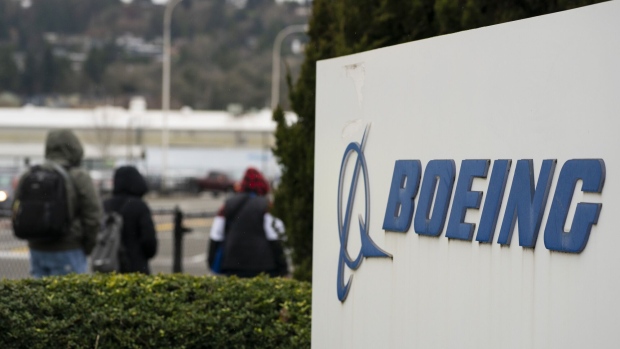Mar 8, 2024
Boeing’s Largest Union Demands 40% Pay Hike in Start to Talks
, Bloomberg News

(Bloomberg) -- Boeing Co.’s largest union kicked off its first full contract talks in 16 years with a bang by asking for a 40% pay raise over three years.
The International Association of Machinists also seeks to lower health care costs, reinstate pensions and a get commitment from Boeing to build aircraft in the Pacific Northwest over the long haul, according Jon Holden, president of the local District 751 chapter who spoke on Friday at the organization’s main offices near Seattle. The union also sees a path to an agreement without striking.
The company’s stock extended declines after the union announced its demands, falling as much as 2.2%.
The negotiations are a test of organized labor’s continued clout as the US labor market eases from its post-pandemic heights. The talks will also signal of whether US unions can keep building on the victories of the past few years when a tight labor market gave them a lot of leverage at the bargaining table.
IAM District 751 — representing more than 32,000 mechanics in Washington and Oregon — seeks to reverse concessions on wages and pensions that Boeing wrested from workers a decade ago during a contentious battle over a contract amendment. The planemaker finds itself in a weaker position because of a tight market for skilled factory workers, and its financial and operational struggles, particularly in the aftermath of a near-catastrophe in January when a door blew off a plane made by Boeing during a flight.
“We’re in a very powerful position now,” Holden said. “We have leverage that’s better than any time in our history, and we’re going to use that. Our members want us to use that.”
In a statement, Boeing said it would continue discussions in “good faith.” The company also said it’s confident in there being a path to a deal that addresses the needs of employees and maintains its competitiveness.
Read More: Boeing Talks Will Test Unions’ Sway as Labor Market Softens
With no new airplane on its drawing boards, Boeing has also lost some of the leverage that it used to great effect in 2014 when it had the threat of moving 777X production from its traditional Puget Sound manufacturing base.
“The stakes are enormous,” said Richard Aboulafia, managing director of AeroDynamic Advisory, an aerospace consulting firm. Boeing was “foolish enough to think it would always be in their favor, that they would have the upper hand.”
The talks kicked off Friday with Holden and other union leaders formally presenting their proposal to Mike Fitzsimmons, Boeing’s global head of labor relations, and his team. The proceedings were amicable, with the sides exchanging statements and talking about their relationship, Holden said.
Over the coming months, about a half dozen subcommittees will go over the proposal line by line. Negotiations typically begin with less contentious non-economic issues and heat up later when it gets to compensation. But given it’s been a long time since the last full talks, the union has proposals to address hundreds of issues, including work-life balance and non-pay matters, Holden said.
Separately, Holden defended the Boeing aircraft that are built by his members and that are being scrutinized after a panel blew out of an airborne Alaska Airlines 737 Max in January. “We build safe airplanes,” Holden said. “Have there been any issues? Yes, but we’re addressing that.”
(Updates with Boeing comment in seventh paragraph.)
©2024 Bloomberg L.P.


